See also
| | This article related to the Hebrew Bible is a stub. You can help Wikipedia by expanding it. |
The Acts of Uzziah is a lost text that may have been written by Isaiah, who was one of King Uzziah's contemporaries. The book is described in 2 Chronicles 26:22. The passage reads: "Now the rest of the acts of Uzziah, first and last, did Isaiah the prophet, the son of Amoz, write."
This manuscript is sometimes called Second Isaiah or The Book by the prophet Isaiah.[ citation needed ]
The Book of Joel is a Jewish prophetic text containing a series of "divine announcements". The first line attributes authorship to "Joel the son of Pethuel". It forms part of the Book of the twelve minor prophets or the Nevi'im ("Prophets") in the Hebrew Bible, and is a book in its own right in the Christian Old Testament. Joel is not mentioned elsewhere in either collection.

Isaiah, also known as Isaias or Esaias, was the 8th-century BC Israelite prophet after whom the Book of Isaiah is named.
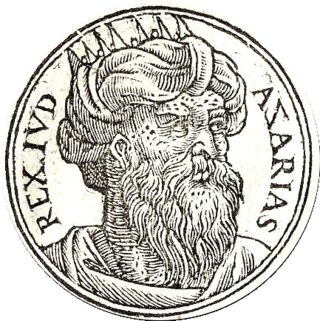
Uzziah, also known as Azariah, was the tenth king of the ancient Kingdom of Judah, and one of Amaziah's sons. Uzziah was 16 when he became king of Judah and reigned for 52 years. The first 24 years of his reign were as a co-regent with his father, Amaziah.
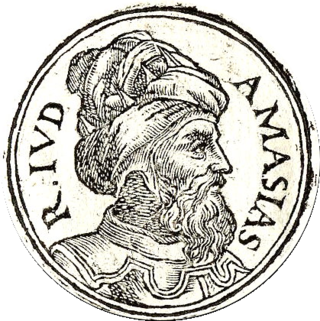
Amaziah of Judah, was the ninth king of Judah and the son and successor of Joash. His mother was Jehoaddan and his son was Uzziah. He took the throne at the age of 25, after the assassination of his father, and reigned for 29 years,, 24 years of which were with the co-regency of his son. The second Book of Kings and the second Book of Chronicles in the Hebrew Bible consider him a righteous king, but with some hesitation. He is praised for killing the assassins of his father only and sparing their children, as dictated by the Mosaic Law.
Azariah is the name of several people in the Hebrew Bible and Jewish history, including:
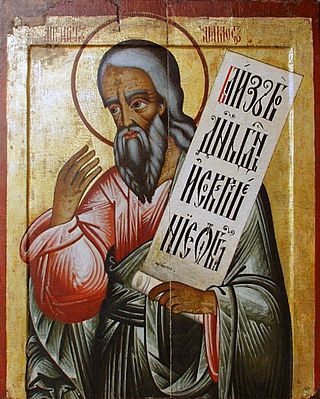
In the Hebrew Bible and Christian Old Testament, Amos was one of the Twelve Minor Prophets. An older contemporary of Hosea and Isaiah, Amos was active c. 760–755 BCE during the rule of kings Jeroboam II of Israel and Uzziah of Judah. He was from the southern Kingdom of Judah but preached in the northern Kingdom of Israel. Amos wrote at a time of relative peace and prosperity but also of neglect of God's laws. He spoke against an increased disparity between the very wealthy and the very poor. His major themes of justice, God's omnipotence, and divine judgment became staples of prophecy. The Book of Amos is attributed to him.
The non-canonical books referenced in the Bible includes non-Biblical cultures, and lost works of known or unknown status. By the "Bible" is meant those books recognized by most Christians and Jews as being part of Old Testament as well as those recognized by some Christians as being part of the Biblical apocrypha or of the Deuterocanon.
The Book of Nathan the Prophet and the History of Nathan the Prophet are among the lost books quoted in the Bible, attributed to the biblical prophet Nathan. They may be the same text, but they are sometimes distinguished from one another. No such text is found anywhere in the Hebrew Bible, so it is presumed to have been lost or removed from earlier texts.
The Book of Shemaiah the Prophet is one of the non-canonical books referenced in the Bible. It was probably written by the biblical prophet Shemaiah, who lived at the time of Rehoboam. This text is sometimes called Shemaiah the Prophet or The Acts of Shemaiah the Prophet.
The Story of the Prophet Iddo is a lost work mentioned in the Bible, attributed to the biblical prophet Iddo who lived at the time of King Rehoboam.
The Book of the Kings of Judah and Israel was separated into the two books of I Kings and II Kings in the Old Testament. The book is described at 2 Chronicles 16:11. The passage reads: "And, behold, the acts of Asa, first and last, lo, they are written in the book of the kings of Judah and Israel." It is also referenced at 2 Chronicles 24:27; "The account of his sons, the many prophecies about him, and the record of the restoration of the temple of God are written in the annotations on the book of the kings. And Amaziah his son succeeded him as king."
The [Book of the] Acts of Solomon is a lost text referred to in 1 Kings 11:41, which reads:

The Sistine Chapel ceiling, painted by Michelangelo between 1508 and 1512, is one of the most renowned artworks of the High Renaissance. Central to the ceiling decoration are nine scenes from the Book of Genesis of which The Creation of Adam is the best known, the hands of God and Adam being reproduced in countless imitations. The complex design includes several sets of individual figures, both clothed and nude, which allowed Michelangelo to fully demonstrate his skill in creating a huge variety of poses for the human figure, and have provided an enormously influential pattern book of models for other artists ever since.
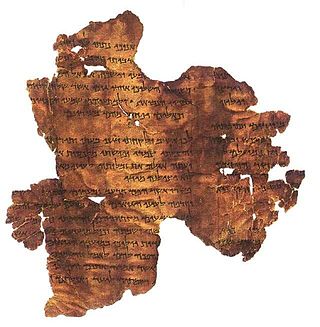
Hosea 1 is the first chapter of the Book of Hosea in the Hebrew Bible or the Old Testament of the Christian Bible. This book contains the prophecies attributed to the prophet Hosea son of Beeri, and this chapter especially sets forth the spiritual whoredom of Israel by symbolical acts. It is a part of the Book of the Twelve Minor Prophets.
Isaiah 1 is the first chapter of the Book of Isaiah, one of the Book of the Prophets in the Hebrew Bible, which is the Old Testament of the Christian Bible. In this "vision of Isaiah concerning Judah and Jerusalem", the prophet calls the nation to repentance and predicts the destruction of the first temple in the siege of Jerusalem. This chapter provides an introduction to the issues of sin, judgement, and hoped-for restoration which form the overarching structure of the whole book. It concludes with 'a reference to the burning of those who trust in their own strength', in a fire which cannot be 'quenched', a relatively rare word which is also used in the last verse of the book, thereby linking together beginning and ending of this whole book. It is traditionally read on the black sabbath immediately preceding the 9th of Av fast day.
Isaiah 7 is the seventh chapter of the Book of Isaiah in the Hebrew Bible or the Old Testament of the Christian Bible. This book contains the prophecies attributed to the prophet Isaiah and is one of the Books of the Prophets.
Isaiah 6 is the sixth chapter of the Book of Isaiah in the Hebrew Bible or the Old Testament of the Christian Bible. This book contains the prophecies attributed to the prophet Isaiah, and is one of the Books of the Prophets. It records the calling of Isaiah to be the messenger of God to the people of Israel.
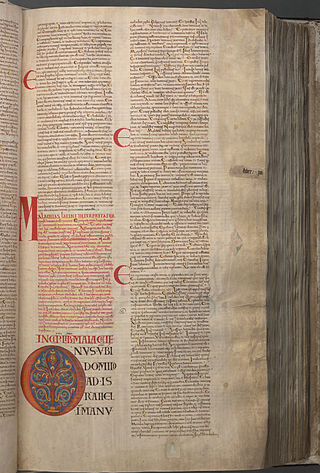
Zechariah 14 is the fourteenth chapter in the Book of Zechariah in the Hebrew Bible and the Old Testament of the Christian Bible. This book contains the prophecies attributed to the prophet Zechariah, and is a part of the Book of the Twelve Minor Prophets. This chapter is a part of a section consisting of Zechariah 9–14. It continues the theme of chapters 12 and 13 about the 'war preceding peace for Jerusalem in the eschatological future'. It is written almost entirely in third-person prophetic discourse, with seven times references to the phrase 'that day'.
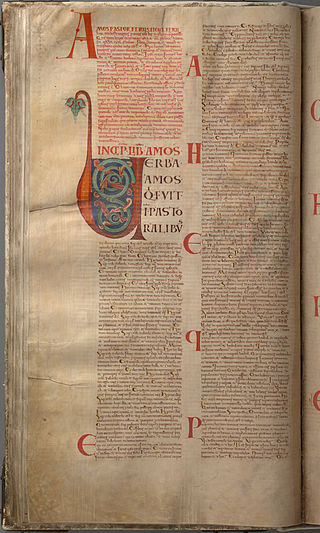
Amos 1 is the first chapter of the Book of Amos in the Hebrew Bible or the Old Testament of the Christian Bible. This book contains the prophecies attributed to the prophet Amos, and is a part of the Book of the Twelve Minor Prophets. This chapter contains the prophecies of God's judgments on Syria, Philistia, Tyre, Edom, and Ammon.

2 Chronicles 26 is the twenty-sixth chapter of the Second Book of Chronicles the Old Testament in the Christian Bible or of the second part of the Books of Chronicles in the Hebrew Bible. The book is compiled from older sources by an unknown person or group, designated by modern scholars as "the Chronicler", and had the final shape established in late fifth or fourth century BCE. This chapter belongs to the section focusing on the kingdom of Judah until its destruction by the Babylonians under Nebuchadnezzar and the beginning of restoration under Cyrus the Great of Persia. The focus of this chapter is the reign of Uzziah, king of Judah.